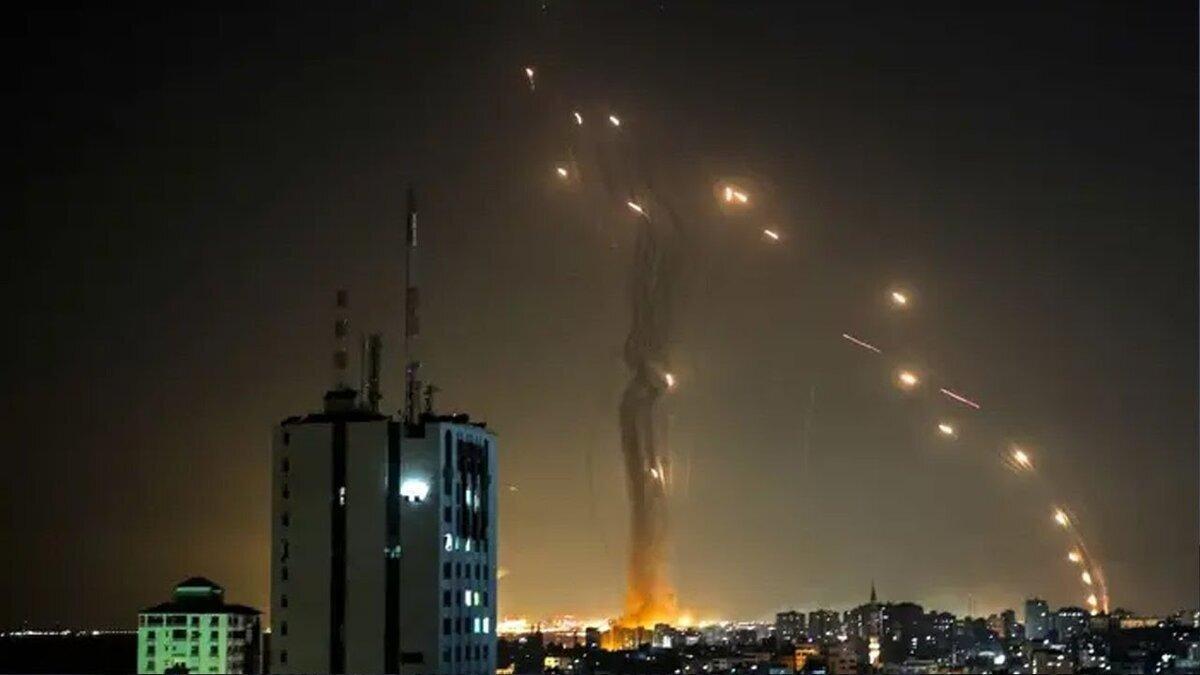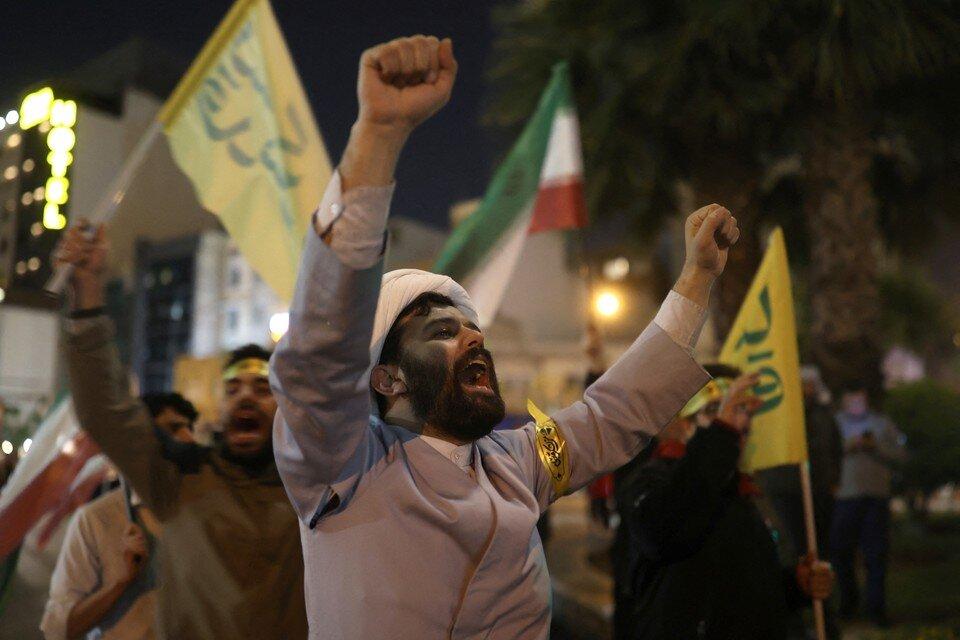Five-front war: Is the Middle East on the brink of all-out war?
Much will depend on the US
ANALYTICS 15 April 2024 - 14:51
| Mikhail Shereshevskiy Caliber.Az |
The shelling of Israel was the next stage in the escalation of the conflict. What will be its scale? That largely depends on the Joe Biden administration.
Photographers captured a glittering swarm of drones in the night sky over the Shiite holy city of Karbala. However, Karbala has seen more than that and will surely see more. In total, Iran fired about 300 drones, ballistic and cruise missiles at Israel. Almost all of them were intercepted by the air defences of Israel's allies - Britain, the US, Jordan - as well as by Israel's own missile defence systems. Jordan's active role in Israel's defence draws attention to itself. It is no coincidence that one of Israel's leading security experts, Amos Harel, has pointed out that this country is more effective in providing defence for his state "than even its own army".

Multi-layered protection, including the unique Iron Dome, proved its effectiveness - only five or seven missiles reached the Israeli Ramon air base. Israel denies that they caused much damage, however, we should wait for reports from independent sources. It was a competition between high-tech countries and Iran, which, although trying to move in the same direction, has not yet reached that level of scientific and technological development.
However, the flip side of the coin is the high cost of defence: overnight Israel spent more than a billion dollars repelling the attack. The drones flying into Israel demonstrated Tehran's ability to launch direct strikes against the enemy. Iran has avoided direct involvement in armed conflicts since the war with Iraq (1980-1988). Then it became clear that the great powers (the USA, USSR, France) would not allow the Iranian empire to carry out direct expansion. Another way was chosen - pumping money and weapons into the allies. This form of expansion was quite successful - pro-Iranian militias and parties largely established their dominance in Iraq, Syria and Lebanon, as well as in parts of Yemen.
Currently, these forces - Iraqi and Syrian Shiite militias, Lebanon's Hezbollah and Yemen's Houthis, and Sunni Hamas, which has joined them - are engaged in an armed struggle against the US-Israel alliance - a struggle for dominance in the Middle East. What at first glance looks like a series of disparate conflicts (the war in Gaza between Israel and Hamas, the shootings between the Israeli army and Hezbollah on the Lebanese-Israeli border, the shelling of American bases in Iraq and Syria, the shelling of merchant ships in the Red Sea by the Houthis, and American strikes against the Houthis) are all elements of one conflict, the great Middle East "War of Five Fronts."
For Iran, this form of expansion is relatively convenient. After all, its own territory is hardly ever attacked, unless you count Israeli covert operations. So why did Iran break the taboo?
A new level of confrontation
In early April, two Israeli F-35 stealth aircraft struck the Iranian consulate in Damascus with six missiles. The attack was precisely timed and intelligence-driven: seven senior Iranian leaders in Syria and Lebanon were in the building at the time of the strike. All of them were killed, including Brigadier General Zahedi, the commander of those forces and a leading leader of the Islamic Republic's armed forces.
Iran found itself in a difficult position. Striking back meant being threatened with an Israeli or even a combined US-Israeli attack (the day before, the Americans threatened that they might join Israeli strikes if Iran attacks Israel). Obviously, Tehran wants to avoid a clash with the region's most powerful air force - the Israeli, not to mention the US.
And we should not forget how difficult the situation in Iran itself remains. National minorities (who make up half of the country's population), youth, women and workers are revolting against the regime. Against the backdrop of constantly rising prices that impoverish the population, the growing disgust of Iranians with the government, powerful illegal strikes organised by informal gatherings of labour collectives, a large and costly war is the last thing the authorities of the Islamic Republic are interested in.
On the other hand, not striking back meant facing a challenge. The consulate is officially considered part of the country's territory. If Israel can attack Iranian territory and kill Iranian generals without any repercussions, then what else will it do? The next step is bombing strategic sites inside Iran itself - the same result as if Iran were to strike.

In the end, the following option was chosen. Iran launched strikes, to put it bluntly, not too effective, but of impressive scale. After that, the country's representative in the UN said: "We attacked the Zionist regime in accordance with Article 51 of the UN Charter (attack in self-defence) after the strike on Damascus. The incident is over, but if the Israeli regime makes another mistake, then Iran's response will be much harsher. This is a conflict between Iran and the Israeli regime, the US should stay out of it."
Just in case, the Iranians also threatened the United States not to interfere or they would become a party to the conflict. This was a sensible move - further involvement in the war in the Middle East is not something that President Biden's administration is interested in.
In other words, Tehran is now saying that after they attacked Israel with drones and missiles, the consulate incident is over. The Iranians are proceeding from a logic that worked well after the assassination of General Soleimani by the Americans in 2020. Back then, Iran retaliated to the general's assassination with a US drone by firing missiles at a US base in Iraq, resulting in no deaths (about 100 US military personnel were concussed). The US was apparently warned of the strike in advance. The Americans didn't go ahead as they weren't interested in a big war with Iran. Same here - Israel killed General Zahedi, so the Iranians shot back. That's it, the topic is over. However, such calculations may turn out to be wrong.
Firstly, Netanyahu, the Prime Minister of Israel, is in a different situation than US President Donald Trump in 2020. The war in Gaza has been going on for more than six months and he has not yet succeeded in destroying Hamas, even though that is what he promised voters. Under US pressure, Israel has been forced to withdraw from the southern Gaza Strip and temporarily abandon the assault on Hamas' last stronghold, the city of Rafah. America is demanding that he de-escalate the conflict, wants him to sit down at the negotiating table. At the moment, his ratings are falling. In addition, street protests against his rule have resumed in Israel, and the opposition is demanding early elections. The only way out of this situation is for him to present himself as a wartime hero, a leader of a warring nation who can unite it and guide it to victory.
Secondly, Israel has long had a grudge against Iran's missile and nuclear industries. Iran is close to developing nuclear weapons, and this is completely unacceptable to the Israeli state. Netanyahu can use the Iranian attack as a pretext to strike Iran's military-industrial complex. If it succeeds in inflicting serious damage, it will help Netanyahu kill two birds with one stone - deprive Tehran of the ability to produce nuclear weapons and strengthen his own credibility in Israel.
Therefore, the Iranians' chess moves, calculated on the basis of the experience of the conflict with America after Soleimani's assassination, may turn out to be wrong. Israel is not America, it does not treat its enemies with ceremony.
Will the US be able to stop the Iran-Israel war?
Washington is interested in ending the "War of Five Fronts". The elections are due in November, and Biden does not intend to take any risks: he does not want to get bogged down in another major conflict in the Middle East - a conflict with unpredictable consequences. Any American military losses, even minor ones, could damage him in the election.
In addition, the latest Bloomberg forecast points to the threat of rising oil prices. With the escalation between Iran and Israel, they may go to $100 per barrel, and in the long term - to 150. This would push the U.S. economy into recession and could dash Biden's already fragile hopes of winning the election.
The U.S. appears to have serious leverage over Netanyahu, since it was able to get him to withdraw from the southern Gaza Strip and stop the attack on the last Hamas strongholds. Perhaps it has to do with the supply of ammunition, especially artillery shells and aerial bombs, as well as spare parts for military equipment. Israel has a very strong army, but it is not self-sufficient. The IDF is designed for a war lasting no more than one month. Without artillery ammunition, bombs and rockets for aviation, it can hardly fight. Biden probably threatened to cut off supplies.

Biden's overnight conversation with Netanyahu indicates Washington's intention to prevent escalation of the conflict. The Axios publication, quoting a senior White House official, told readers that during that phone call, the American president said that the United States would not participate in an Israeli retaliatory strike on Iran and would not support such operations. Israel may be allowed to retaliate against Iran, but further deterred by threats, as happened in Gaza. But will it bear fruit? What if, in the event of an Israeli strike on Iran, there is a response to the response?
Summarising some of the results: much will depend on the US desire, efforts and capabilities to de-escalate the Iran-Israel standoff.
The views and opinions expressed by guest columnists in their op-eds may differ from and do not necessarily reflect the views of the editorial board.
Caliber.Az
|
1
|
Kazakhstan denies sale of military airplanes to Ukraine
28 April 2024 - 14:26
|
|
2
|
Erdogan hurries Yerevan: Time is running out Expert opinions on Caliber.Az
27 April 2024 - 13:58
|
|
3
|
ATACMS for Ukraine Winning the war against Russia
27 April 2024 - 09:45
|
|
4
|
Azerbaijan's response to European Parliament resolution A geopolitical analysis
27 April 2024 - 11:11
|
|
5
|
Ocampo vs Azerbaijan - money waster Attempted provocation in Berlin
27 April 2024 - 10:15
|
Oil prices start week with loss as demand concerns grow
29 April 2024 - 23:00
Slovakia reports 82% surge in illegal border crossings from Ukraine
29 April 2024 - 21:02
Heydar Aliyev Foundation, Chinese People's Association for Friendship with Foreign Countries discuss cooperation
PHOTO29 April 2024 - 20:53
CDRI to present telecoms resilience study at COP29
29 April 2024 - 20:50
Scotland's First Minister resigning
29 April 2024 - 20:39
Türkiye backs Mark Rutte as next NATO chief
29 April 2024 - 20:27
Ukraine's new ambassador to Azerbaijan presented copies of his credentials
PHOTO29 April 2024 - 20:13
Azerbaijan, UNDP discuss activities on green energy transition
PHOTO29 April 2024 - 20:00
Ukrainian MP: Ruben Vardanyan's nomination for Nobel Peace Prize is unacceptable
29 April 2024 - 19:55
Azerbaijan, OPEC Fund focus on private sector financing
29 April 2024 - 19:46
MEP condemns European Parliament's biased stance on Azerbaijan
29 April 2024 - 19:32
Denmark considers drafting women into army
29 April 2024 - 19:19
Tajikistan lodges protest with Russia over mistreatment of its citizens
29 April 2024 - 19:05
Health Ministry: Some 34 more Palestinians killed in Gaza as Israeli onslaught continues
29 April 2024 - 18:53
Over half of planned works completed on Azerbaijan-Armenia border
29 April 2024 - 18:40
NATO Secretary General arrives in Ukraine
29 April 2024 - 18:26
European Commission director general to tour South Caucasus countries
29 April 2024 - 18:20
Finance Minister: IsDB Group to provide $6.3 billion financing for Türkiye
29 April 2024 - 18:12
US Secretary of State hopes Hamas takes “extraordinarily generous” truce offer
29 April 2024 - 17:59
Türkiye supports Dutch prime minister as new NATO secretary-general
29 April 2024 - 17:48
Armenian PM to skip out Russian leader’s inauguration
29 April 2024 - 17:39
Azerbaijan detects over 150 mines in liberated lands
29 April 2024 - 17:34
Kazakhstan not to act as mediator for Armenia-Azerbaijan foreign ministers’ meeting
29 April 2024 - 17:22
Mr Fouks - the servant of too many masters
How much does the reputation cost?29 April 2024 - 17:15
Grand Duke of Luxembourg invited to COP29
29 April 2024 - 17:07
Could Georgia’s foreign agents bill backfire?
Between bad and worse29 April 2024 - 17:05
Harvard anti-Israel protesters fly Palestinian flag as demonstrations ramp up across country
VIDEO29 April 2024 - 16:52
Thousands of former Wagner fighters are now answering to Moscow
Article by POLITICO29 April 2024 - 16:38
Uzbek culture minister to visit Azerbaijan
29 April 2024 - 16:23
Israel intercept rockets fired at Upper Galilee settlements
29 April 2024 - 16:10
Azerbaijan to host National Carpet Festival for first time
PHOTO29 April 2024 - 15:56
World's largest airport terminal to be built in Dubai
PHOTO/VIDEO29 April 2024 - 15:44
German far-right coup plot trial to begin soon
29 April 2024 - 15:31
Azerbaijan contributes to “One Belt, One Road” initiative through its contacts with neighboring countries
PHOTO29 April 2024 - 15:25
Azerbaijan to commission four more hydroelectric power stations in Kalbajar
PHOTO / VIDEO29 April 2024 - 15:18
Political analyst: Border demarcation - maximum benefit for Armenia
29 April 2024 - 15:05
Global militarisation: A disturbing trend in contemporary international relations
Caliber.Az analysis29 April 2024 - 14:59
Georgian former minister detained at rally against bill on foreign agents
29 April 2024 - 14:54
Azerbaijani foreign minister heads to Qatar
29 April 2024 - 14:47
Some 700 guests to visit sixth World Forum on Intercultural Dialogue in Azerbaijan
29 April 2024 - 14:40
